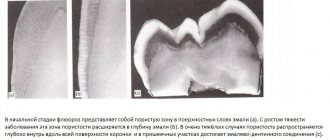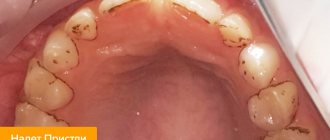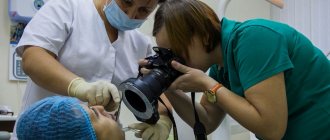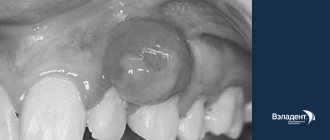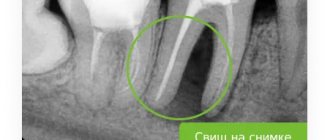- What is implantation?
- Rejection symptoms
- Why does rejection happen?
- Treatment
- Recommendations
- Is it possible to undergo re-implantation?
- How to avoid complications
Among dental procedures, one of the most popular is dental implantation. Its demand is justified by its main purpose - restoration of teeth or a complete dentition. Often patients are afraid to decide on a mini-surgery not only because of the fear of pain, but also because of the fear of complications, especially with regard to rejection of the artificial root. Before you decide to undergo implantation, we recommend that you find out why a dental implant is rejected, what the symptoms and consequences may be.
What is implantation?
The dental procedure “implantation” according to the technique used is considered a complex and traumatic operation. It should be understood that surgery is a stage of prosthetics. The implant itself is an artificial root onto which a crown is subsequently fixed. After installation of an implant, rehabilitation does not always take place without negative consequences.
Complications may be mild (swelling, bleeding, severe pain, etc.). However, normally the symptoms disappear within a few days. If signs of abnormalities become more intense, you should consult a doctor.
Certain consequences are normal, since when installing an implant, soft gum tissue and bone tissue are injured. But only a specialist can determine what is normal and what is pathology, so it is advisable not to delay a visit to the doctor in order to prevent more severe complications in time.
How long does it take for an implant to take root?
An artificial root (implant) is a foreign body for the body, so it takes a lot of time to engraft. Experts confirm that the complete healing process in the upper jaw takes longer than in the lower jaw. This is explained by the physiological properties of the jaw and the functions of each of its parts.
On the lower jaw, which bears a large load, the artificial root takes root within four months, and on the upper jaw - about six months. The rehabilitation period largely depends on the installation process (whether the specialist makes mistakes), the implantation method, the type of product and the care of the patient’s oral cavity.
It is during the healing period that implant rejection can occur. This can happen both in the first weeks after implantation and after several months. It is important to notice the symptoms in time.
Primary stability
In our center, the engraftment (in scientific terms - stability) of the implant is checked using a special Osstell ISQ device a few days after the procedure. This helps eliminate the possibility of early implant rejection, and if this begins, promptly replace the artificial root.
The point of the procedure is to register resonant electromagnetic oscillations of the implant and surrounding bone when exposed to an electromagnetic field through a magnetized pin. Simply put, a signal from the device’s magnet is applied to a pin screwed to a titanium root. The implant begins to oscillate, and the force of these oscillations is taken as the implant stability coefficient (ISI). The range of KSI is from 1 to 100, and the higher the value, the better the stability of the implant. The acceptable range starts at 58 KSI units for the maxilla and 66 units for the mandible. 3-6 months after surgery, these indicators are on average 61 and 65 units, respectively.
Unfortunately, such a device is not available in all clinics where implantation is performed, and doctors often check the implant’s survival the old-fashioned way: if there are symptoms, then something is wrong. And the danger lies in the fact that if re-implantitis is not detected in the early stages, the alteration will cost both additional money and additional health.
If one of the four implants does not take root at all, then it is unscrewed and replaced with another artificial root. As a rule, this procedure is carried out at the clinic’s expense, but it is a good idea to clarify before treatment whether this is true or not.
Rejection symptoms
It is not always possible to determine the signs that an implant is failing without examining a doctor. Symptoms are often perceived by patients as the natural survival of the product. It is for this reason that in case of severe violations it is recommended to consult a specialist.
If the patient experiences serious problems, then the main signs of dental implant rejection will appear: the smell of pus from the oral cavity, severe bleeding, redness of the gums with accompanying swelling. There may be a general deterioration in health (including fever) and a feeling of severe aching pain that does not go away.
Smell of pus
As a rule, suppuration immediately after implant installation occurs if the patient developed gum inflammation before the procedure (which is a contraindication to the procedure). If the smell of pus appears after several weeks, this indicates a protracted development of complications.
Peri-implantitis is an infectious inflammation of soft tissues. With peri-implantitis, pus may be released, which forms in the area between the titanium root and the gum tissue. The cause is the penetration of infection inside.
If peri-implantitis is not treated on time, the gums gradually acquire a loose structure, and a gum canal is formed with further enlargement. Microbes, saliva and food particles penetrate into it, which aggravates the situation and can lead not only to implant rejection, but also to the complete destruction of dental bone tissue.
Bleeding
Immediately after the procedure, minor bleeding is considered acceptable. However, if after three days the bleeding does not stop, complications should be assumed. Rejection can result from damage to blood vessels, followed by the appearance of a hematoma and suture dehiscence.
If the patient's suture comes apart, there is a risk of pathogenic organisms entering, which will lead to relaxation of the artificial root. Pathological bleeding is accompanied by pain, gum pocket formation, hypothermia and tissue swelling.
Why does rejection happen?
Common complications after implantation include pain, redness and swelling of the tissue. But no doctor can rule out complete rejection of the artificial root. However, this occurs in only 2% of those patients who have resorted to this method of tooth restoration.
The reasons for the rejection of dental implants can be different, but the main provoking factor is the penetration of pathogenic microorganisms. The natural root is always protected since access to it is limited by soft tissue and hard enamel. During the implantation process, there is always a risk of infection due to the fault of the patient or the doctor. The reasons also include the body’s reaction to the prosthesis.
Doctor's error or poor quality material
In most cases, the reason why the implant insert unscrews is due to the mistakes of the doctor performing the operation. Therefore, it is important to approach the choice of a clinic and specialist with special attention.
What could be the implantologist’s mistake:
- the implant is incorrectly selected;
- omission of the presence of inflammatory processes in the oral cavity;
- use of insufficient sterilization of instruments;
- overheating of bone tissue when installing a pin;
- incorrect installation of the prosthesis.
The specialist may also be to blame for a complication in the patient if the doctor did not first refer the patient for diagnostics and was not convinced that there are no contraindications to implantation.
Another reason why dental implants do not take root is the quality of the artificial root. Despite having licenses and certificates, the clinic may use low-quality implants. In this case, in 90% of cases, the product is rejected with accompanying inflammation.
Patient mistakes
The likelihood of the implant twisting and developing other complications is higher if the patient himself does not follow the doctor’s recommendations after implantation.
What violations of recommendations cause pin rejection:
- uncontrolled use of medications;
- refusal to use antibiotics prescribed by the dentist;
- violation of nutritional recommendations;
- visiting places with a sharp contrast in temperature (saunas, baths, etc.);
- insufficient oral hygiene;
- drinking alcohol or smoking in the first days after surgery;
- drug use (absolute contraindication).
A problem with installed artificial roots can arise if the patient himself has hidden existing health problems due to the desire for dental reconstruction.
Rejection of the implant by the body
Even modern types of implants and hypoallergenic products can be rejected by the body if the patient is allergic to the material from which the artificial root is made, or has such a feature as the body does not perceive any foreign bodies.
Due to the risk of implant rejection due to the body’s natural rejection, it is not recommended to carry out the implantation procedure for people with weakened immune systems, those suffering from severe chronic diseases, those with a tendency to allergic reactions, as well as those who have been diagnosed with pathologies of the oral cavity and maxillofacial diseases.
When can dental implant failure occur?
Classical implantation takes place in several stages: installation of an abutment, gum former, prosthetics. Treatment may take six months or a year. The implant takes 4 months for the lower jaw and 6 months for the upper jaw. The complete process of osseointegration ends in about a year.
The implant may fail at different times:
- Short-term - from 3 months to six months. The main reasons are inflammatory processes around the implant, allergies, poor quality of the implantation system, and medical error.
- Medium term - in 2, 3 years. The rod is destroyed due to overload, poor oral hygiene, and bad habits.
- Long-term - after 4, 5 years. The problem arises against the background of endocrine disorders, systemic pathologies, dental diseases, especially jaw bone tissue.
Some medications can have a negative effect: heartburn medications, antidepressants.
Treatment
After implantation, the condition of the oral cavity and the healing process must be monitored by the implantologist (for this purpose a control visit is carried out), and the patient himself. Experts advise paying attention to symptoms during the rehabilitation period. It must be remembered that rejection of the artificial root can occur even after several months, since the engraftment period takes up to 6 months.
If pathological symptoms occur, you must immediately contact the specialist who performed the operation. As a rule, if the implant is not accepted by the body, an inflammatory process begins. The longer the complication progresses, the more difficult it is to further treat.
Before unscrewing the implant, the doctor may order diagnostics (x-rays). Based on the results of the examination, a decision is made on the need to remove the prosthesis.
Treatment methods:
- opening the gums to cleanse the cavity of pus;
- unscrewing the plug from the implant for cleaning;
- complete removal of the implant.
For any type of complications accompanied by an inflammatory process, antiseptic treatment of the area where the prosthesis is installed and antibiotics are necessary. In each case, the treatment method is determined individually.
What to do if a dental implant does not take root
If symptoms of titanium root rejection appear, you should contact the doctor who performed the implantation. After diagnosis, it will become clear whether conservative treatment can be carried out, or whether the implant will need to be removed.
Surgical intervention will be necessary if inflammatory processes have affected the jaw bone and deep soft tissues. Typically, the pin is removed and osteoplasty is performed. If the intraosseous part is in order, it is enough to remove the abutment and perform gum grafting.
If the problem repeats two or three times, then perhaps the patient has undetected pathologies that prevent good implant healing.
Recommendations
Implant failure is rare, but you can reduce the likelihood of such a problem to a minimum if you read and adhere to the recommendations before implantation.
Advice from implantologists:
- select the clinic and doctor with special care (read the clinic’s documentation and reviews);
- undergo a preliminary examination and, if necessary, treat pathologies that are a contraindication to surgery;
- strengthen your gums before and after implantation;
- do not hide the presence of contraindications from the specialist;
- follow your doctor's recommendations;
- do not violate the rules of oral hygiene.
Preparation for the procedure for implantation and further oral care is the best prevention of negative consequences.
Preventive actions
According to statistics, implantation systems take root in 95 - 99%, that is, the rejection rate is no more than 5%. To a large extent, the responsibility for good engraftment and long service life of artificial roots lies with the patient. To avoid having to resort to re-implantation, you must follow your doctor’s recommendations.
Rules for the rehabilitation period:
- visit a doctor regularly;
- in the first two weeks after surgery, eat soft food at a comfortable temperature, do not overheat or overcool the body, and avoid intense physical activity;
- you cannot smoke or drink alcoholic beverages;
- carefully monitor oral hygiene: brush your teeth twice a day, use dental floss to clean the interdental spaces, use mouth rinses;
- eat well, you can take additional vitamins;
- strengthen immunity;
- Treat dental and other diseases in a timely manner.
Following simple rules will help maintain the integrity of your teeth for decades.
Is it possible to undergo re-implantation?
Even despite the difficulties and complications that arise, many patients wish to undergo a repeat procedure. This is possible, but you must first establish what the reasons and signs were for implant rejection. Each case is considered separately.
Features of re-implantation, depending on the causes of the complication:
- a medical error was made, it is necessary to contact another specialist;
- the patient did not comply with the recommendations, then additional consultation is carried out about behavior after implantation;
- natural rejection occurred due to an allergic reaction, etc., then it is possible to install another type of prosthesis;
- the product was of poor quality, then you should choose another clinic and a different type of pin.
If the patient had contraindications that he did not know about or did not inform the implantologist about, re-implantation is impossible. As in the case when the body does not perceive any foreign bodies.
How is the repeat procedure performed?
Implantation can be performed next time only after 4 - 8 weeks. The structure is first dismantled and a course of medications is prescribed to eliminate inflammation, restore tissue and strengthen the immune system.
The success of re-implantation is influenced by compliance with the technique of removing the first implant. Depending on the condition, the product can be removed with simple manipulations, but if access to the pin is limited, the gum is excised. In the case where the artificial root has partially taken root, sawing of the bone will be required.
Stages of treatment - high quality, not scary and without pain
The surgical operation to install or replace an implant, from the point of view of an experienced implant surgeon, is considered simple; effective local anesthesia is often used.
If the patient wishes, the operation can be performed under sedation. During primary implantation
: in modern dentistry, painless tooth extraction is practiced before an implant; an implant is immediately placed in the resulting hole. The express method is popular and is considered gentle for the patient.
When replacing an implant
: if an implant is removed, a high-quality innovative system will be installed instead of the removed artificial tooth.
Almost 100% of re-interventions are successful. The procedure is divided into stages
:
- the finishing crown is removed (if any),
- the ineffective implant is removed from the bone tissue,
- the cause that caused the pathological processes is eliminated,
- a new implant is installed.
In case of severe complications resulting in removal of the implant, the operation to install a new tooth is expected after some time - a maximum of 2 months.
How to avoid complications
No clinic or specialist can give a 100% guarantee that after the implantation procedure there will be no rejection. However, if we take into account that if all recommendations are followed and the professional approach of the specialist there is practically no risk, then we can talk about a 99% guarantee. The only exception is the natural immunity of the body.
Clinic “A - Medic” offers implantation services by qualified implantologists using high-quality materials. We care about the health of patients and further results after the procedure, therefore we pay special attention not only to the operation, but also to the preparation for it.
Features of the method
Installation of a dental implant
– this is the first thing a dentist considers when a patient with partial or complete edentia (loss of teeth) comes to him.
The method is not applicable only if there are a small number of contraindications, including:
• Oncological diseases;
• pregnancy;
• severe form of diabetes mellitus;
• systemic autoimmune pathologies;
• alcoholism.
In this case, the doctor considers the possibility of making other structures.
But in most cases, implantation is indicated, and the specialist recommends this method to the patient first. However, some people still consider it a kind of lottery. They think that it is an element of luck: whether the dental implant will take root or not. In fact, the risk of non-engraftment is so small that there is practically no cause for serious concern.


